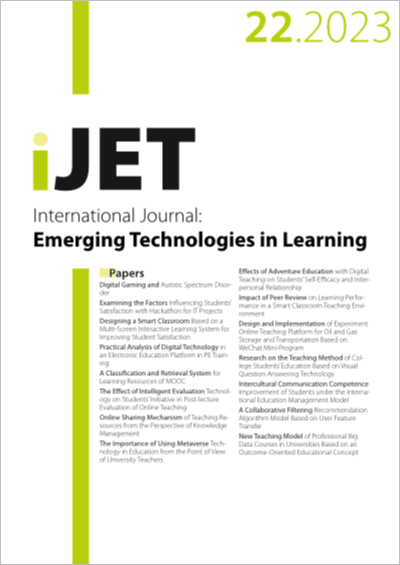A Collaborative Filtering Recommendation Algorithm Model Based on User Feature Transfer
DOI:
https://doi.org/10.3991/ijet.v18i22.43987Keywords:
Transfer learning, Flipped classroom, Collaborative filtering, Tourism management, Arrangement of teaching resourcesAbstract
The quality of teaching resources and recommended practices in flipped classrooms determine the advantages and disadvantages of this educational model. However, current teaching resource recommendation platforms suffer from issues such as cold startup and sparse data. In order to address these issues, a collaborative filtering recommendation algorithm based on user feature transfer was proposed and utilized to examine the correlation between students’ preference behavior and the recommendation of teaching resources in flipped classes for tourism management. The aim was to enhance the quality of teaching in current classes. Using this algorithm, a transfer by user feature (TUF) model is constructed. In this model, a soft embedding method is employed to accurately extract user feature information in the auxiliary space. This method addresses the challenge of filling large-scale missing matrices in the auxiliary space. Additionally, singular value decomposition is performed to obtain more precise user features. Finally, an optimized Wiberg algorithm with rapid convergence is designed to solve the constructed model. The performance of this algorithm is measured and compared using two common datasets. Compared to other algorithms, the proposed algorithm demonstrates superior performance and a lower mean absolute error value. In summary, the recommendation algorithm can enhance the quality of resource organization and provide more suitable personalized recommendations for the recommendation platform. This is beneficial for improving the quality of students’ learning.
Downloads
Published
How to Cite
Issue
Section
License
Copyright (c) 2023 Jing Han

This work is licensed under a Creative Commons Attribution 4.0 International License.



